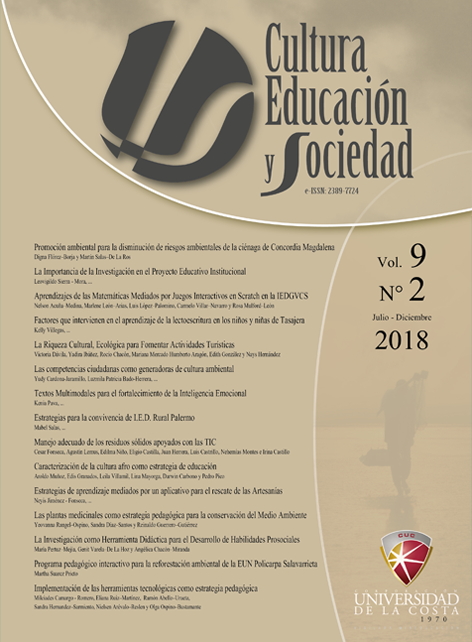Research as a didactic tool for the development of prosocial skills
DOI:
https://doi.org/10.17981/cultedusoc.9.2.2018.13Keywords:
Assertiveness; effective communication; synergy; social skillsAbstract
This project was carried out in order to establish pro-social skills develop students with ages ranging between nine and eleven years, grade 6 1 and 6 of the IED San Juan Bautista de El Retén Magdalena, headquarters. Through a quantitative methodology, a sample group that participates in a research process is followed through the project "I fall in love with my municipality: El Retén land of traditions" and aims to highlight the social skills developed by the students they participate in the research project aiming at reducing conflicts. Therefore, we conclude that students acquire social skills as they participate in this type of projects where they have the possibility of interacting with others, working as a team
Downloads
References
Alberti, R.E. y Emmons, M.L. (1978). (3ª ed.). Your perfect Right: A Guide to Assertive Behavior. San Luis Obispo, California: Impact Publishers.
Arias, C. (2006) Proyecto de investigación. Editorial episteme, c.a. Caracas- Ven
Caballo, V. (2005). Manual de Evaluación y entrenamiento de las habilidades sociales. (6° Edición). Madrid: Siglo XXI.
Calzadilla, M (2010). Aprendizaje colaborativo y tecnología de la información y la comunicación. Universidad pedagógica experimental Libertador
Cerda, H. (2008) Los elementos de la investigación, editorial el búho, Bogotá.
Guerrero. H, Cepeda,M.(2016) Uso de estrategias pedagógicas para el fortalecimiento de la convivencia escolar de jóvenes.
Hernández, R. (2007) Metodología de la Investigación.
Lacunza, Ana (2011). Las habilidades sociales en niños y adolescentes. Su importancia en la prevención de trastornos psicopatológicos. Universidad del Norte Santo Tomás de Aquino.
Moreno, L (2009). La comunicación efectiva para el logro de una visión compartida. Gulcyt Comunicación. Año 6 N° 32 (2009)
Ortiz, S y Peñaranda, R (2015) Estrategia de intervención para el desarrollo de habilidades en niños y niñas escolares. Universidad Cooperativa de Colombia.
(s.f) Formar en ciencias: Estándares Básicos de Competencias en Ciencias Naturales y Ciencias Sociales SERIE GUÍAS No 7. Lo que necesitamos saber y saber hacer. El desafío Lo que necesitamos saber y saber hacer. Recuperado de: http://www.convivenciaescolar.cl/index2.php?id_seccion=4010&id_portal=50&id_contenido=17916
Martíez Royert JC. (2014). Modelo de evaluación del Proceso de Atención de Enfermería. [Tesis doctoral], Universidad del Atlántico, Atlántico, Barranquilla. Doi:10.13140/RG.2.2.35792.00000
Pérez, M. (2016) La importancia de las habilidades sociales en los niños. Psicología Clínica y de la Salud. Documento recuperado de: https://isepclinic.es/blog/la-importancia-las-habilidades-sociales-los-ninos/
Pereira & Cadavid (2011) Comunicación, desarrollo y cambio social Interrelaciones entre comunicación, movimiento ciudadanos y medios. Documento Recuperado De: http://www.javeriana.edu.co/unesco/pdf/comunicacion_desarrollo_cambio_social2.pdf
Phillips, E. L., (1978).The social skills bases of psychopathology. Londres: Grune and Stratton.
Spina, M., Rohvein, C., Urrutia, S., Roark, G., Paravié, D., & Corres, G. (2016). Aplicación del modelo SCOR en pymes metalmecánicas de Olavarría. INGE CUC, 12(2), 50-57. https://doi.org/10.17981/ingecuc.12.2.2016.05
Delgado, R. (2010). Relaciones interpersonales en la adolescencia: Implementación de un programa de entrenamiento en asertividad y habilidades sociales para adolescentes de 1º y 2º de la ESO. (Tesis de Pregrado). Universidad de Granada. España
Downloads
Published
How to Cite
Issue
Section
License
Copyright (c) 2018 CULTURA EDUCACIÓN Y SOCIEDAD

This work is licensed under a Creative Commons Attribution-NonCommercial-NoDerivatives 4.0 International License.
![]()
Creative Commons 2020 CULTURA EDUCACIÓN Y SOCIEDAD
This article is under international license Creative Commons Reconocimiento-NoComercial-SinObrasDerivadas 4.0.
The published articles are the sole responsibility of their authors and do not necessarily reflect the opinions of the editorial committee.
CULTURA EDUCACIÓN Y SOCIEDAD respects the moral rights of its authors, who assign to the editorial committee the patrimonial rights of the published material. In turn, the authors inform that this work is unpublished and has not been previously published.
All articles are under a:
Licencia Creative Commons Atribución-NoComercial-SinDerivadas 4.0 Internacional.
![]()


 English
English
 Español (España)
Español (España)




_12.53_.27_p_. m_._3.png)





_12.57_.35_p_. m_._3.png)
_12.50_.37_p_. m_._3.png)



